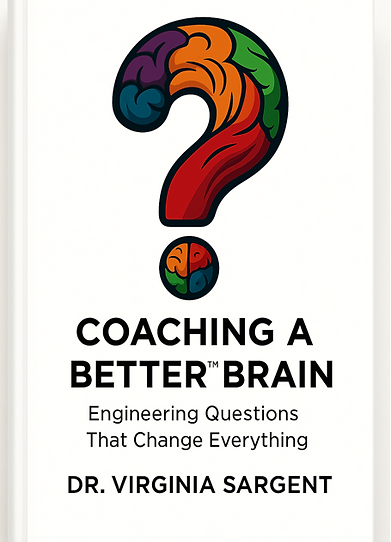Order your copy now!!!
Our Books
Coaching a BETTER Brain
In a world where AI can answer anything, the real power lies in asking the question that matters. Coaching a BETTER Brain is the essential guide for every coach, leader, and changemaker who wants to master the science of timing, trust, and transformation. Dr. Virginia Sargent introduces the groundbreaking field of Question Engineering™—teaching you how to craft questions that align with the brain’s natural sequence for change. This isn’t just a book—it’s a roadmap for coaching in the AI age. If you’re ready to ask questions that land, shift, and rewire, buy this book today.”

Featured Articles
Want to Know What the Brain Needs to Change?
Neuroscience is catching up with what great coaches have always known: The brain moves in sequence. According to Dr. Richard Boyatzis’ Intentional Change Theory, transformation begins with attention, emotion, and trust. Learn more [here →]
Accelerating Coaching Culture Thru AI
Source: Association for Talent Development
Perhaps the least surprising 2025 trend is the rise in AI tools within the workplace. The World Economic Forum found that 85 percent of organizations identify increased adoption of new technologies as the trend driving transformation in their organization, and it’s shaping the future of coaching and professional development.
Why It Matters: Your question isn’t just a prompt—it’s an input that sparks neural activation.
Using Prompt Engineering to Better Communicate with People
Source: Harvard Business Review
It seems like everyone knows, or wants to know, how to produce the best possible prompts for generative AI. Having the right prompts can, in theory, allow managers to gather important information in a matter of seconds. But, among the buzz and promise of masterful prompt engineering, there is an emerging risk that managers will view generative AI as a one-stop-shop for gathering information.
Why It Matters: In doing so, they may neglect their most valuable information resources: employees, partners, and customers. These stakeholders offer contextual information and tacit knowledge that is beyond the capability of any generative AI tool. As we get better at speaking to robots, we should remember how to most effectively speak to our colleagues and customers, too.
Why Prompt Engineering Needs Humans
Source: MIT Technology Review
Crafting the right prompt becomes an essential skill, guiding AI towards desired outcomes and ensuring optimal results. The promise of AI systems like ChatGPT, Claude, and others lies in their ability to adapt and learn from your carefully crafted inputs, mimicking human conversation and generating pertinent outputs.
Even in AI, the quality of the question (prompt) shapes the entire output. Crafting clear, intentional prompts—based on what the system can understand—is a human skill that drives meaningful results.
Why It Matters: Our questions matter more than ever—to people and to machines.
Intentional Change Theory
Source: Dr. Richard Boyatzis, Case Western Reserve University
Sustainable change happens in a specific brain-based sequence: envisioning the ideal self, recognizing the current self, engaging in learning, and being supported in relationship. We can now say with some certainty that t Intentional Change Model can help people to engage in personal transformation successfully, and with excitement and enthusiasm.
Why It Matters: The BETTER Brain™ Framework builds on this sequence by aligning questions with the brain's stage of readiness.
Download the 2006 original research paper of Dr. Boyatzis here.


